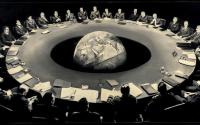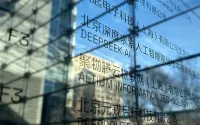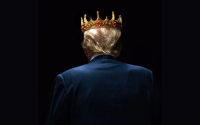Thursday August 24, 2006
The Guardian
It's described by a senior official at the Ministry of Defence as "a dead duck ... expensive and obsolete". The editor of World Defence Systems calls it "10 years out of date". A former defence minister remarked that it is "essentially flawed and out of date". So how on earth did BAE Systems manage to sell 72 Eurofighters to Saudi Arabia on Friday?
One answer is that it had some eminent salesmen. On July 2 2005, Tony Blair secretly landed in Riyadh to persuade the Saudi princes that this flying scrapheap was the must-have accessory for every fashionable young despot. Three weeks later the defence secretary John Reid turned up to deploy his subtle charms. Somehow the deal survived, and last week his successor, Des Browne, signed the agreement. All of which raises a second question. Why are government ministers, even Blair himself, prepared to reduce themselves to hawkers on behalf of arms merchants?
Readers of this column will know that British governments are not averse to helping big business, even when this conflicts with their stated policies. But the support they offer the defence industry goes far beyond the assistance they provide to anyone else.
Take the Defence Export Services Organisation (DESO), for example. This is a government agency founded 40 years ago to smooth out foreign deals for British arms companies. From its inception, this smoothing involved baksheesh. It was established as a channel for "financial aids and incentives" to corrupt officials in foreign governments.
In 2003, after bribery of this kind became illegal in the UK, the Guardian found an internal DESO document explaining its guidelines for arms sales. "In certain parts of the world," it said, "it has become commonplace for special commissions to be required. This is a matter for DESO, to whom all requests for special commission should be referred. If DESO confirm that such payments can be made, contracts staff may need to provide the means for payment." A "special commission" is civil service code for a bribe. The document suggests, in other words, that the British government is overseeing the payment of bribes to foreign officials.
BAE's previous deals with Saudi Arabia are surrounded by allegations of corruption. It is alleged to have run a £60m "slush fund" to oil the Al Yamamah contracts brokered by Margaret Thatcher. The fund is said to have been used to provide cash, cars, yachts, hotel rooms and prostitutes to Saudi officials. One of the alleged beneficiaries was Prince Turki bin Nasser, the Saudi minister for arms procurement. The Serious Fraud Office was bounced by the Guardian's revelations into opening an investigation. But among the conditions the Saudi government laid down for the new deal is that the investigation is dropped. Let's see what happens.
With this exception, the big arms companies appear to have been granted immunity from inquiry or prosecution. Letters from the permanent secretary at the Ministry of Defence, Sir Kevin Tebbit, show that he prevented the ministry's fraud squad from investigating the allegations against BAE; that he failed to tell his minister about the investigation by the Serious Fraud Office; and that he tipped off the chairman of BAE about the contents of a confidential letter the SFO had sent him. When the US government told him that BAE had allegedly engaged in corrupt practice in the Czech Republic, Sir Kevin failed to inform the police.
For 14 years, the government has suppressed a report by the National Audit Office into the Al Yamamah deals. Earlier this summer the auditor general refused even to hand it over to the SFO. A parliamentary committee on arms exports published a report this month that expresses its frustration over the government's reluctance to assist its inquiries. It also shows that Mark Thomas, the stand-up comedian, has done more to expose illegal arms deals than the Ministry of Defence, the Export Control Organisation and HM Revenue and Customs put together, simply by searching the internet and the trade press and attending the arms fairs the British government hosts.
In response, the government has investigated not the companies, but the comedian. A confidential email from a civil servant suggested that the trade minister, Richard Caborn, was seeking to gather "background/dirt on him in order to rubbish him". Caborn says that he was misrepresented.
The only arms dealers to have been prosecuted since 2000 are five very small fish. All of them escaped with a small fine or a suspended sentence, including a man who made repeated attempts to export military parts to Iran. Compare this to the treatment of those who upset the arms industry. Nine anti-war campaigners in Derry who occupied the offices of the arms company Raytheon have just been charged with aggravated burglary and unlawful assembly. If convicted, they could be imprisoned for years.
Every government policy designed to protect our national interests or promote world peace is torn up at the arms companies' request. They are not supposed to sell to dodgy regimes or countries in the midst of conflict. So let them first export their arms to the Channel Islands, from which they can be resold. Weapons may not be exported to any country unless it shows "respect for human rights". So get the Foreign Office to note "a small but significant improvement" in the Saudi government's performance and use that as your excuse.
Should we be surprised that, as the Times revealed on Monday, Israeli soldiers have found night-vision equipment made by a British company in Hizbullah bunkers? Should we be surprised that despite a government commitment to sell Israel "no weapons, equipment or components which could be deployed aggressively in the occupied territories", British companies have been supplying parts for its Apache helicopters and F-16 bombers? The government seems to see the escalating dangers in the Middle East as nothing but an opportunity for business.
Perhaps most damning is this. Blair claims that Britain's security comes first. Yet one of the means by which his government managed to secure this deal was to speed it up. How? The Sunday Times reports that "the first 24 planes for the Saudis will be those at present allotted to the Royal Air Force, with the RAF postponing its deliveries until later in the production run". In other words, the Saudis' perceived need for fighter planes takes precedence over our own.
So why does Her Majesty's Government behave like a subsidiary of BAE? A report by the Campaign Against the Arms Trade (CAAT) shows that 39% of all the senior public servants who go to work for the private sector are employees of the Ministry of Defence moving into arms firms. In return, scores of arms dealers are seconded to the ministry. The man who runs DESO, for example, previously worked for BAE, selling arms in the Middle East.
CAAT lists the government committees stuffed with arms executives, the donations, the lobbyists, the Labour peers taking the corporate shilling, and I am sure all this plays an important role. But it seems to me that something else is at work. There appears to be a sense among some at the core of government that peace, human rights and democracy are for wimps, while the serious business, for real players, is war and the means by which it is enacted.






